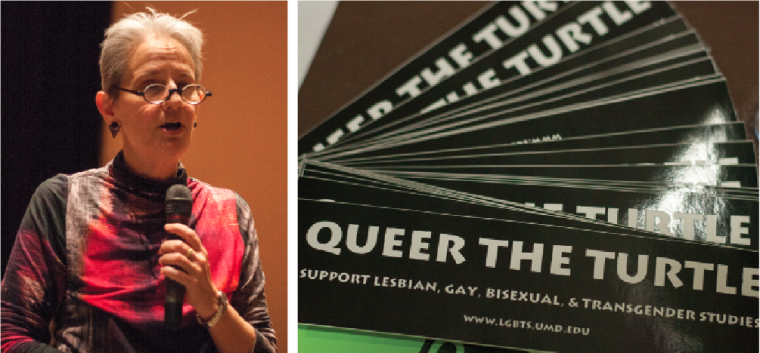
Marilee Lindemann (left), director of the university’s LGBT studies program, speaks at Hoff Theater before the screening last night of The New Black, a documentary about LGBT rights.
Guests in Hoff Theater last night erupted in applause as the images on the screen recalled the passage of Question 6, this state’s same-sex marriage referendum.
The referendum’s passing in 2012 was celebrated as a victory for many of the subjects in Yoruba Richen’s documentary film The New Black, which screened in Stamp Student Union’s Hoff Theater last night. The film and a following discussion with Richen composed the first part of the LGBT studies program’s twelfth annual lecture series, themed Queer Intimacies.
The film explores the intersection of race, religion and politics in this state’s black community, where Richen said same sex marriage is a hotly contested issue. The film focuses specifically on the lead-up to the 2012 elections, showcasing “the African American community’s evolution on the issue,” Richen said.
“There has been an assumption that the African-American community is particularly homophobic because of the power and influence of the black church,” said LGBT studies program Director Marilee Lindemann, who hosted the event. “Anything that complicates these overly simplistic assumptions is all to the good.”
Richen said the film was not originally going to focus on this state, but that the story brought her here. Richen said she started work on the film in response to the 2008 election of President Obama and the passage of Proposition 8, which banned gay marriage in California.
“It was a night that we felt a lot of elation, obviously, for the election of the first black president, and then there was this big gay marriage defeat. And what happened pretty much immediately after was that they started to blame African-Americans for its passage,” Richen said. “I wanted to see why these two groups were being pitted against each other and how it became black against gay. And within that, there was a complete loss of voices from the black LGBT community.”
Six prominent figures on both sides of the issue, ranging from religious leaders to activists, recount their experiences, and three — including university alumna Karess Taylor-Hughes — were present at last night’s event to speak alongside Richen after the screening.
Taylor-Hughes, who graduated in December 2010, played a key role as part of LGBT rights goup Equality Maryland in the 2012 passage of the state’s same sex marriage legalization bill, also known as Question 6 for itsspot as a referendum item on voter ballots, in 2012, as showcased in the film. She said the strength and support she built at this university helped her power through the struggle for votes.
“It means everything to me to have it here,” Taylor-Hughes said. “I would not be the person that I am today without this university, and I mean that from the bottom of my heart. It was this school who built me.”
The film was brought to this university partly due to the efforts of Christina Hanhardt, associate professor in American studies and LGBT studies, who attended Brown University with Richen as an undergraduate student.
“It worked out really beautifully to bring her and the film and a couple of the people in the film to come talk about it and show it and have conversation,” Lindemann said.
Junior animal science major Lex Matthews heard about the event through an advertisement and thought the conversation was an intriguing one.
“I heard about it on Facebook and it sounded interesting,” Matthews said. “I don’t have many expectations; I read a short synopsis online, but that was it.”
Those who missed the event can see The New Black tonight at MICA’s Brown Center in Baltimore, Feb. 12 at West End Cinemas in Washington and June 16 on PBS’ Independent Lens.



